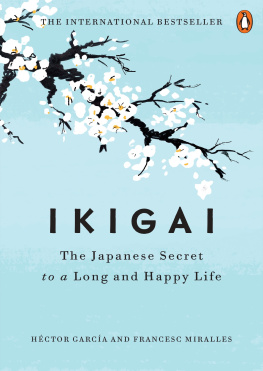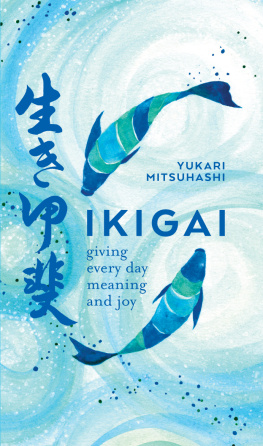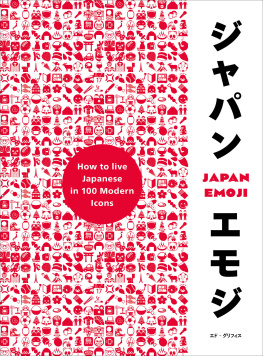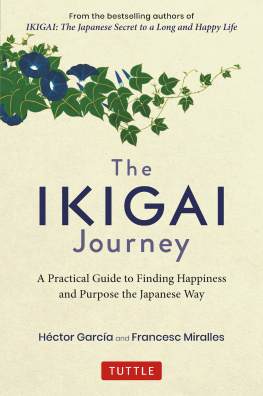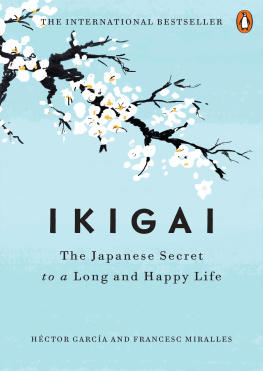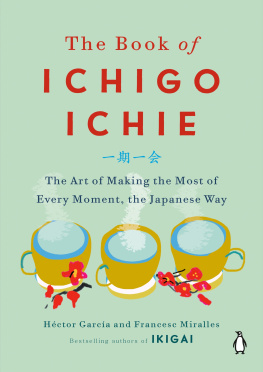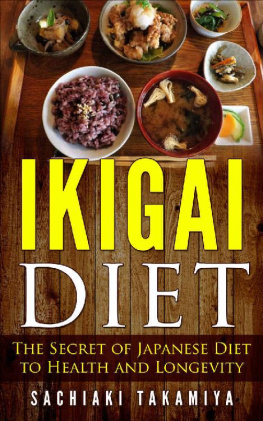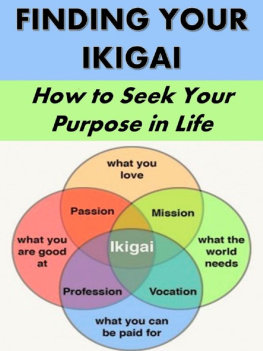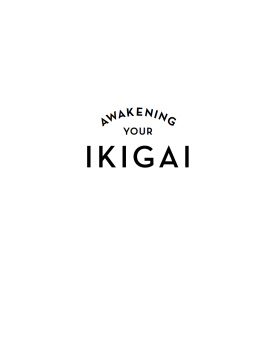PENGUIN BOOKS
An imprint of Penguin Random House LLC
375 Hudson Street
New York, New York 10014
penguin.com
Copyright 2016 by Hctor Garca and Francesc Miralles
Translation copyright 2017 by Penguin Random House LLC
Penguin supports copyright. Copyright fuels creativity, encourages diverse voices, promotes free speech, and creates a vibrant culture. Thank you for buying an authorized edition of this book and for complying with copyright laws by not reproducing, scanning, or distributing any part of it in any form without permission. You are supporting writers and allowing Penguin to continue to publish books for every reader.
Originally published in Spanish as Ikigai: Los secretos de Japn para una vida larga y feliz by Ediciones Urano, Barcelona.
Illustration : Abbie/Shutterstock
All other illustrations copyright 2016 by Marisa Martnez
Graphics copyright 2016 by Flora Buki
LIBRARY OF CONGRESS CATALOGING-IN-PUBLICATION DATA
Names: Garca, Hctor, 1981 author. | Miralles, Francesc, 1968 author.
Title: Ikigai : the Japanese secret to a long and happy life / Hctor Garca and Francesc Miralles ; translated by Heather Cleary.
Other titles: Ikigai. English
Description: New York : Penguin Books, [2017] | Originally published in Spanish as Ikigai: Los secretos de Japn para una vida larga y feliz by Ediciones Urano in 2016." | Includes bibliographical references. | Description based on print version record and CIP data provided by publisher; resource not viewed.
Identifiers: LCCN 2017005811 (print) | LCCN 2017022599 (ebook) | ISBN 9781524704551 (ebook) | ISBN 9780143130727 (hardcover)
Subjects: LCSH: LongevityJapan. | Longevity. | Happiness. | Quality of life
Classification: LCC RA776.75 (ebook) | LCC RA776.75 .G3713 2017 (print) | DDC 613dc23
LC record available at https://lccn.loc.gov/2017005811
Neither the publisher nor the author is engaged in rendering professional advice or services to the individual reader. The ideas, procedures, and suggestions contained in this book are not intended as a substitute for consulting with your physician. All matters regarding your health require medical supervision. Neither the author nor the publisher shall be liable or responsible for any loss or damage allegedly arising from any information or suggestion in this book.
While the author has made every effort to provide accurate telephone numbers, Internet addresses, and other contact information at the time of publication, neither the publisher nor the author assumes any responsibility for errors or for changes that occur after publication. Further, the publisher does not have any control over and does not assume any responsibility for author or third-party Web sites or their content.
Cover illustration by Olga Grlic
Cover art direction by Roseanne Serra
Version_2
For my brother, Aitor,
whos said to me more often than anyone else,
I dont know what to do with my life.
H CTOR G ARCA
For all my past, present, and future friends,
for being my home and my motivation along
the way.
F RANCES C M IRALLES
Only staying active will make you want to live a hundred years.
Japanese proverb
CONTENTS
PROLOGUE
Ikigai: A mysterious word
T HIS BOOK FIRST came into being on a rainy night in Tokyo, when its authors sat down together for the first time in one of the citys tiny bars.
We had read each others work but had never met, thanks to the thousands of miles that separate Barcelona from the capital of Japan. Then a mutual acquaintance put us in touch, launching a friendship that led to this project and seems destined to last a lifetime.
The next time we got together, a year later, we strolled through a park in downtown Tokyo and ended up talking about trends in Western psychology, specifically logotherapy, which helps people find their purpose in life.
We remarked that Viktor Frankls logotherapy had gone out of fashion among practicing therapists, who favored other schools of psychology, though people still search for meaning in what they do and how they live. We ask ourselves things like:
What is the meaning of my life?
Is the point just to live longer, or should I seek a higher purpose?
Why do some people know what they want and have a passion for life, while others languish in confusion?
At some point in our conversation, the mysterious word ikigai came up.
This Japanese concept, which translates roughly as the happiness of always being busy, is like logotherapy, but it goes a step beyond. It also seems to be one way of explaining the extraordinary longevity of the Japanese, especially on the island of Okinawa, where there are 24.55 people over the age of 100 for every 100,000 inhabitantsfar more than the global average.
Those who study why the inhabitants of this island in the south of Japan live longer than people anywhere else in the world believe that one of the keysin addition to a healthful diet, a simple life in the outdoors, green tea, and the subtropical climate (its average temperature is like that of Hawaii)is the ikigai that shapes their lives.
While researching this concept, we discovered that not a single book in the fields of psychology or personal development is dedicated to bringing this philosophy to the West.
Is ikigai the reason there are more centenarians in Okinawa than anywhere else? How does it inspire people to stay active until the very end? What is the secret to a long and happy life?
As we explored the matter further, we discovered that one place in particular, Ogimi, a rural town on the north end of the island with a population of three thousand, boasts the highest life expectancy in the worlda fact that has earned it the nickname the Village of Longevity.
Okinawa is where most of Japans shikuwasaa limelike fruit that packs an extraordinary antioxidant punchcomes from. Could that be Ogimis secret to long life? Or is it the purity of the water used to brew its Moringa tea?
We decided to go study the secrets of the Japanese centenarians in person. After a year of preliminary research we arrived in the villagewhere residents speak an ancient dialect and practice an animist religion that features long-haired forest sprites called bunagayawith our cameras and recording devices in hand. As soon as we arrived we could sense the incredible friendliness of its residents, who laughed and joked incessantly amid lush green hills fed by crystalline waters.
As we conducted our interviews with the eldest residents of the town, we realized that something far more powerful than just these natural resources was at work: an uncommon joy flows from its inhabitants and guides them through the long and pleasurable journey of their lives.
Again, the mysterious ikigai.
But what is it, exactly? How do you get it?
It never ceased to surprise us that this haven of nearly eternal life was located precisely in Okinawa, where two hundred thousand innocent lives were lost at the end of World War II. Rather than harbor animosity toward outsiders, however, Okinawans live by the principle of ichariba chode, a local expression that means treat everyone like a brother, even if youve never met them before.
It turns out that one of the secrets to happiness of Ogimis residents is feeling like part of a community. From an early age they practice

